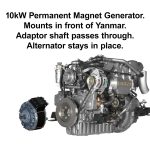We are focussing on the side or pad mount BMG which offeres greater flexibility at same output power for Marine market. We will re-introduce this unit at 20kW Power in Q3 2025
Comparison of Permanent Magnet Generator and traditional Alternator
-
- 1. Efficiency:
- Permanent Magnet Generator (PMG): PMGs are known for their high efficiency, often exceeding 90%. This efficiency is due to their design, which minimizes energy losses during power generation.
- 48V Alternator: Traditional alternators typically have lower efficiency, ranging between 55% and 75%. This is primarily because of energy losses in the conversion process and mechanical components.
2. Maintenance:
- PMG: With fewer moving parts and the absence of brushes or slip rings, PMGs require minimal maintenance, leading to longer service intervals and reduced downtime.
- Alternator: Alternators have components like brushes and slip rings that are subject to wear and tear, necessitating regular maintenance to ensure optimal performance.
3. Power Output and Stability:
- PMG: Designed to provide consistent power output with minimal fluctuations, PMGs are suitable for applications requiring stable voltage and current, which is crucial for charging lithium batteries.
- Alternator: Alternators may experience voltage fluctuations, especially under varying load conditions, which can be less ideal for sensitive charging applications.
4. Size and Weight:
- PMG: Generally more compact and lighter due to their efficient design, PMGs are advantageous in applications where space and weight are constraints.
- Alternator: Alternators can be bulkier and heavier, potentially posing challenges in installations with limited space.
5. Compatibility with Lithium Batteries:
- PMG: The stable and efficient power output of PMGs makes them well-suited for charging lithium batteries, which require precise charging parameters to ensure longevity and safety.
- Alternator: While alternators can charge lithium batteries, they may require additional regulation to maintain the appropriate charging profile, adding complexity to the system.

